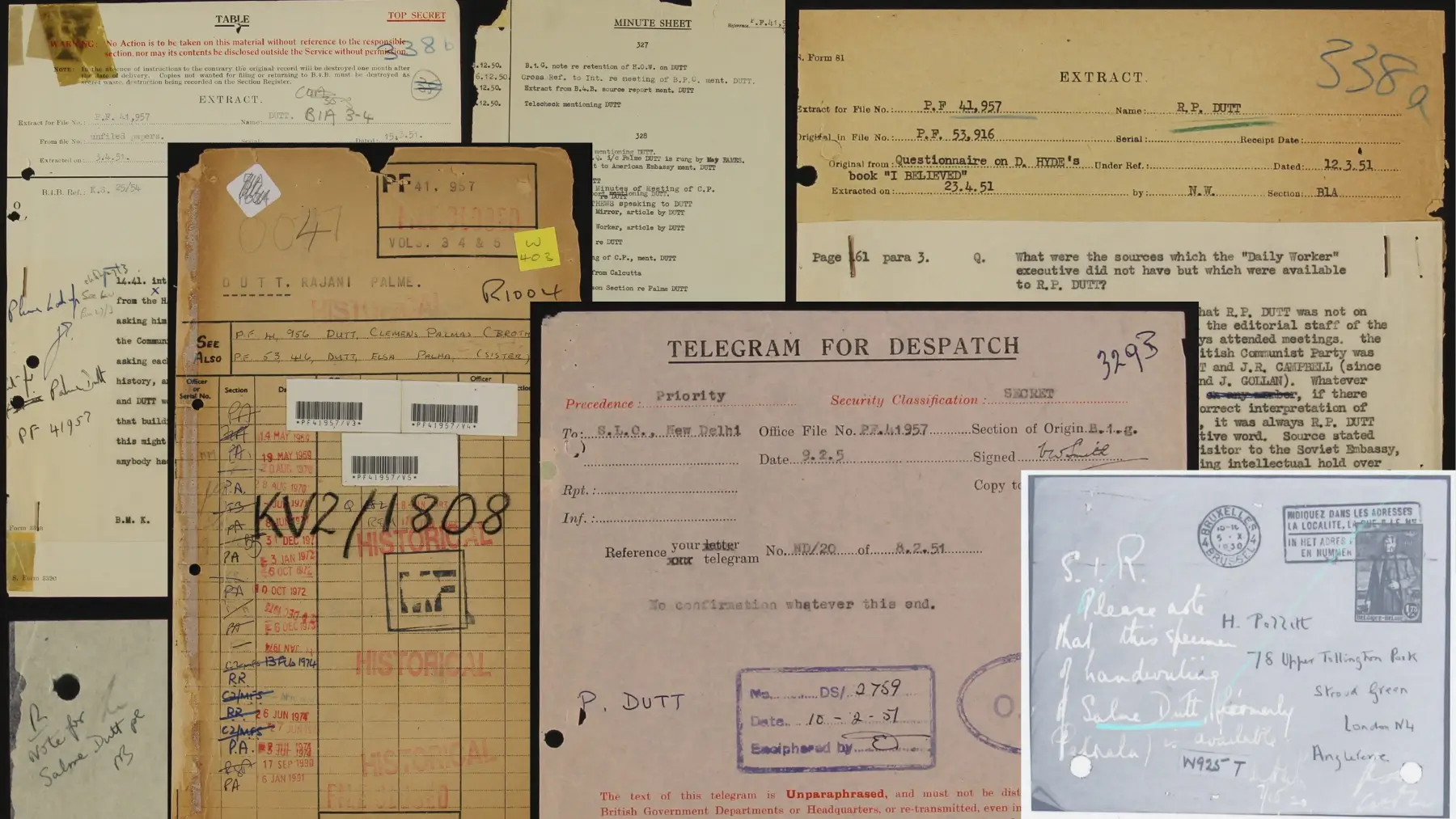│By Jade Burnett, Gale Ambassador at the University of Sheffield│
British Security Service files from Gale’s Political Extremism and Radicalism archive have a huge amount to tell us about British political life in the twentieth century. These files deal with the activities of extreme British political figures and movements. At first, these files may seem somewhat inaccessible, compiled in large folders, containing information which spans long periods of time and refers to a range of different figures, often with little context. However, once you get an understanding of how the archival documents are best used and approached, there are huge benefits to using them for academic research.
How to Approach Security Service Files
The first few pages of the files often have a very basic contents section, which can offer some pieces of context about the file. However, these contents are not necessarily completely reliable, as they sometimes do not perfectly correlate to the contents of the file and may have become tricky to read overtime. Therefore, the best thing to do is approach with a strategy, knowing the sorts of information that you are looking to research, but to be willing to give some time to dive in and explore the documents. There is so much information to find, and so many avenues that your research can be taken down when you are willing to commit some time and effort to unravelling them.
Using Security Service Files – Information Obtained Through Phone Tapping
There are several aspects of left-wing British political life that can be researched using Security Service documents. British Security Service files from within the Political Extremism and Radicalism archive are an excellent way to piece together information about the networks and connections on the British left, both professional and political, as they tend to offer personal communication information obtained through phone tapping.
For example, the document below from May 1951 demonstrates that the Labour Monthly, a Communist Party associated publication, was trying to get in touch with Communist Party politician Raji Palme Dutt. Whilst we are given little contextual information about this phone call, it demonstrates the connections that existed between high-ranking members of the Party and the Party’s affiliated publications. This information would be significant for anyone researching intellectual connections on the British left.
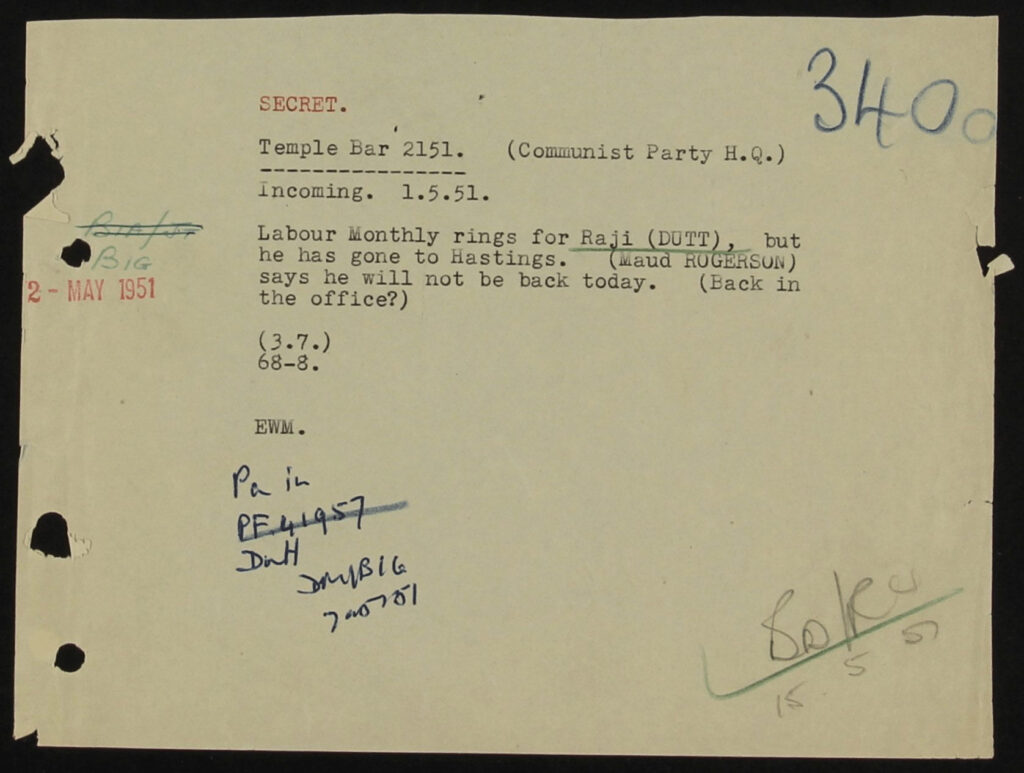
Illuminating Relationships and Connections
Similarly, these files have a lot of potential for those interested in the interpersonal relationships of British communists. For example, the document below from 1942 briefly details a conversation held between Rajani Palme Dutt and Harry Pollitt, two members of the Communist Party of Great Britain (CPGB) leadership. The document illuminates the tensions between the two men, with Dutt complaining of his workload in a “tired voice”, and Pollitt arguing that Dutt “is not the only one” who is tired. Similarly, the document offers information about the working relationship between Palme Dutt and his wife Salme Dutt.
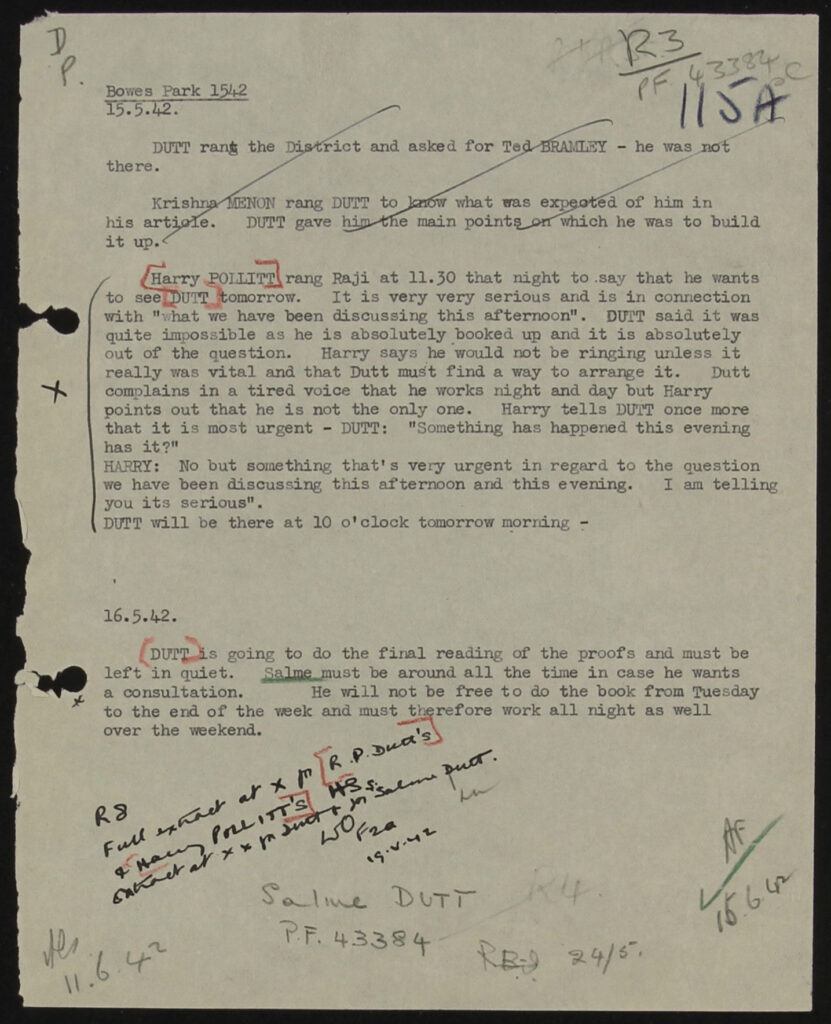
The document establishes that Dutt is in the process of writing and is doing the “final reading of the proofs” and as such “must be left in quiet” and is working “all night”. Salme must be present at all times in case he “wants a consultation”. This insight into the private domestic life of a married couple has a lot to tell us about gender and relationships on the British left. We can see that the marriage between the Dutts is one which has a consideration of women’s intellectual contribution and is one which is based closely on communist association. These snippets of information offer an insight into the personal connections that existed in the British communist movement and offer information about relationships which may not be offered in the autobiographies of these figures.
Revealing the Lived Experience of those Under Surveillance
The Security Service: Personal (PF Series) Files on Communists and Suspected Communists are also very good for illuminating some of the concerns of the British state in relation to political extremism.
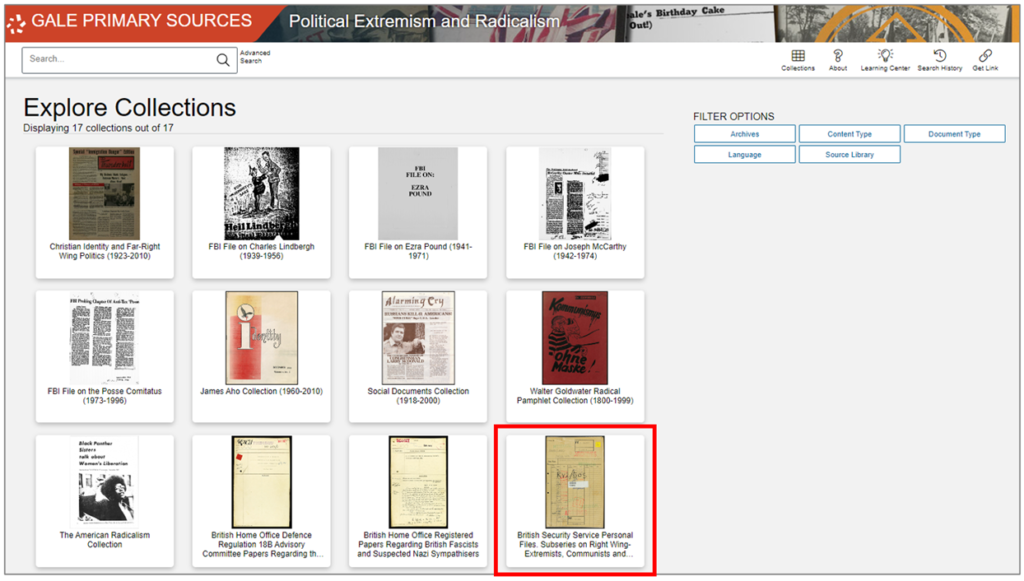
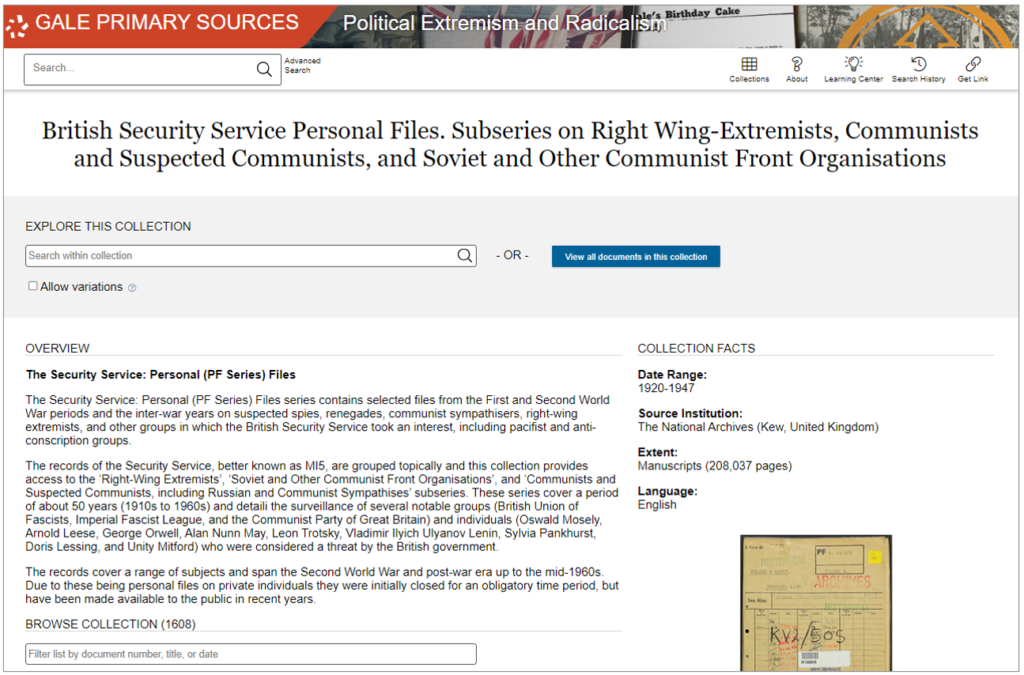
The document below from 1940 is interested in Salme Dutt having been tasked with locating a new safe house for the leadership of the CPGB, to be used if they need to “go underground”. The report requests that Dutt be followed, and the addresses that she visits be noted down. The document stresses the importance that Dutt is not aware that she is being followed and that the issue of surveillance on Dutt is “very important”. This demonstrates the real fear that British communism created for the state security services and shows the sort of activity of communists with which the security services were concerned.
The document can also tell us about the nature of lived experience for British communists, demonstrating the concerns that existed around surveillance and security, and the belief of British communists that there may come a time in which hiding from the state may be necessary.
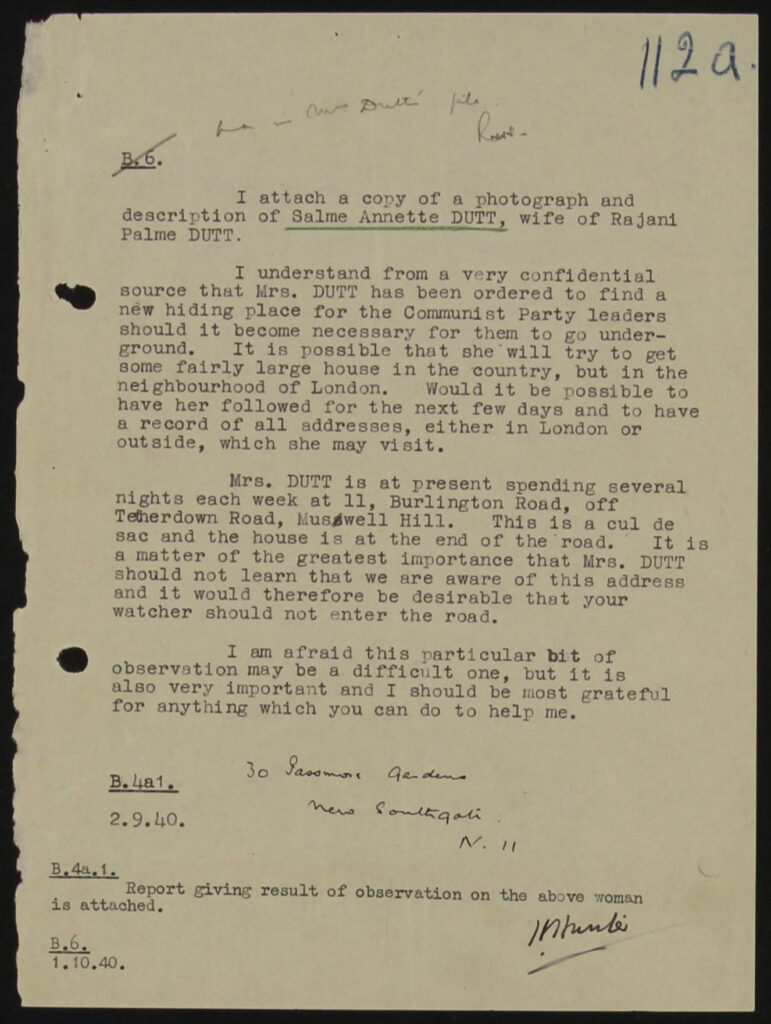
A Wealth of Material to Explore
Whilst these archives may at first seem daunting and inaccessible, devising a strategy of identifying individuals and events of interest is a helpful way to simplify the task and get started in your research. Once you find files which are of relevance to your studies, there is so much interest to be had in searching through such documents for interesting pieces of information.
If you enjoyed reading about how to make use of British Security Service documents, try:
- How State Papers Online Can Support an Undergraduate History Dissertation
- How Important Was the Role of Women During WWII to the Victory of the Allied Powers?
- Was Oxford University Labour Club “Moving Towards Communism”? How Primary Sources Can Help You Track the History of Your Student Society
Blog Post Cover Image Citation: Montage of documents created from the following two files:
KV 2/1808: The Security Service: Personal (PF Series) Files. Communists and Suspected Communists, Including Russian and Communist Sympathisers. …The National Archives (Kew, United Kingdom). Political Extremism and Radicalism, https://link.gale.com/apps/doc/CFTJHT670985680/PLEX?u=su_uk&sid=bookmark-PLEX&xid=700566c5&pg=1 and
KV 2/513: The Security Service: Personal (PF Series) Files. Communists and Suspected Communists, Including Russian and Communist Sympathisers. … The National Archives (Kew, United Kingdom). Political Extremism and Radicalism, https://link.gale.com/apps/doc/CDASMF057371010/PLEX?u=su_uk&sid=bookmark-PLEX&xid=af439ba0&pg=1

